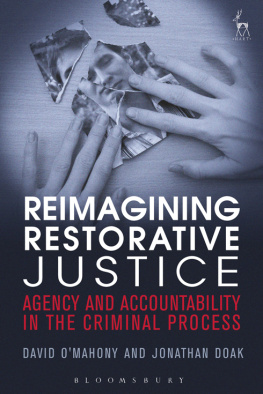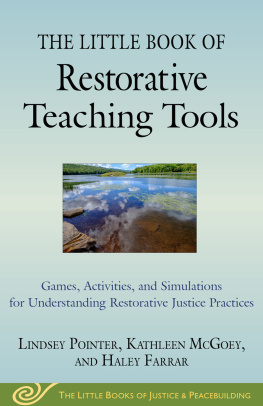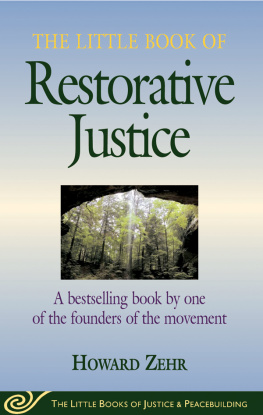Police are understood largely as crime-fighting professionals, yet some highly effective policing involves partnering with others to increase public safety, prevent crime, and respond to related social problems. In this engaging work Kerry Clamp and Craig Patterson explain how restorative policing can extend the earlier reforms of community- and problem-oriented policing. They offer striking examples of police working as street-level leaders, working with citizens, rather than simply doing things to and for them. The discussion extends well beyond theory and high level strategy, to the practicalities of program implementation, and an impressively accurate account of how conflict resolution processes actually work, and may help us to reconnect with one another.
David B. Moore, Restorative Justice Pioneer, Australia
Kerry Clamp and Craig Paterson deal in this outstanding book with restorative policing, recognising the central role played by police in restorative justice practices and radicalising the importance of one of the most neglected aspects of community policing, more precisely the empowerment of the very same community. The new restorative police should act no longer as decision-makers, but as contributors to the construction of collective efficacy, or to the capacity of the community to solve its own problems. Restorative Policing: Concepts, theory and practice gives clever guidance in this endeavour. It is instructive, insightful and practical at the same time. A book that speaks clearly to a broad readership.
Paul Ponsaers, Ghent University, Belgium
Clamp and Patersons inspired integration of restorative justice and policing scholarship provides both a compelling vision and a solid theoretical foundation to guide the evolution of restorative policing for generations to come. Particularly provocative is their discussion on lengthening the restorative policing lens, as it offers a linchpin between restorative and transformative justice with theoretical implications well beyond the topic of restorative policing.
Paul McCold, Independent Criminologist and member of the Global Steering Committee, Restorative Justice International
Restorative policing is a new philosophy and practice of policing, which links to community policing and problem-oriented policing, but draws also upon restorative practices to provide a different way of working with local communities to solve conflicts whilst building the community. Restorative Policing draws together both theory and what has been found to be effective practice to take forward and develop what it means to police restoratively. It is a key text for both practitioners and scholars.
Joanna Shapland, Edward Bramley Professor of Criminal Justice and Director of the Centre for Criminological Research, University of Sheffield, UK
Restorative Policing
In the UK and elsewhere, restorative justice and policing are core components of a range of university programmes; however, currently no such text exists on the intersection of these two areas of study. This book draws together these diverse theoretical perspectives to provide an innovative, knowledge-rich text that is essential reading for all those engaged with the evolution and practice of restorative policing.
Restorative Policing surveys the 25-year history of restorative policing practice, during which its use and influence over criminal justice has slowly grown. It then situates this experience within a criminological discussion about neo-liberal responses to crime control. There has been insufficient debate about how the concepts of restorative justice and policing sit alongside each other and how they may be connected or disconnected in theoretical and conceptual terms. The book seeks to fill this gap through an exploration of concepts, theory, policy and practice. In doing so, the authors make a case for a more transformative vision of restorative policing that can impact positively upon the shape and practice of policing and outline a framework for the implementation of such a strategy.
This pathbreaking book will be of interest to undergraduate and postgraduate students taking courses on restorative justice, policing and crime control, as well as professionals interested in the implementation of restorative practices in the police force.
Kerry Clamp is a Senior Lecturer in Criminology in the Department of Social Sciences and Psychology at the University of Western Sydney, Australia. She received her PhD from the University of Leeds in 2010 and also holds degrees from the University of Sheffield and the University of South Africa. Her research agenda focuses on the intersections of restorative justice and transitional justice, and of restorative justice and policing.
Craig Paterson is a Principal Lecturer in Criminology at Sheffield Hallam University, UK. His teaching and research interests include surveillance and commercial crime control, policing, crime prevention and criminological theory.
Routledge Frontiers of Criminal Justice
28 Lives of Incarcerated Women
An international perspective
Edited by Candace Kruttschnitt and Catrien Bijleveld
29 Pre-crime
Pre-emption, precaution and the future
Jude McCulloch and Dean Wilson
30 Accountability of Policing
Edited by Stuart Lister and Michael Rowe
31 International Developments and Practices in Investigative Interviewing and Interrogation
Volume 1: Victims and witnesses
Edited by David Walsh, Gavin Oxburgh, Allison Redlich and Trond Myklebust
32 International Developments and Practices in Investigative Interviewing and Interrogation
Volume 2: Suspects
Edited by David Walsh, Gavin Oxburgh, Allison Redlich and Trond Myklebust
33 Punishing the Other
The social production of immorality revisited
Anna Eriksson
34 Improving Criminal Justice Workplaces
Translating theory and research into evidence-based practice
Paula Brough, Jennifer Brown and Amanda Biggs
35 Experiencing Imprisonment
Research on the experience of living and working in carceral institutions
Edited by Carla Reeves
36 Restorative Justice in Transitional Settings
Edited by Kerry Clamp
37 Prisoner Radicalization and Terrorism Detention Policy
Institutionalized fear or evidence based policy-making?
Tinka M. Veldhuis
38 Drugs, Evidence, and Policy
The Shaping of Belgian Drug Policy, 19962003
Julie Tieberghien
39 Restorative Policing
Concepts, theory and practice
Kerry Clamp and Craig Paterson
First published 2017
by Routledge
2 Park Square, Milton Park, Abingdon, Oxon OX14 4RN
and by Routledge
711 Third Avenue, New York, NY 10017
Routledge is an imprint of the Taylor & Francis Group, an informa business
2017 Kerry Clamp and Craig Paterson
The right of Kerry Clamp and Craig Paterson to be identified as authors of this work has been asserted by them in accordance with sections 77 and 78 of the Copyright, Designs and Patents Act 1988.
All rights reserved. No part of this book may be reprinted or reproduced or utilised in any form or by any electronic, mechanical, or other means, now known or hereafter invented, including photocopying and recording, or in any information storage or retrieval system, without permission in writing from the publishers.







